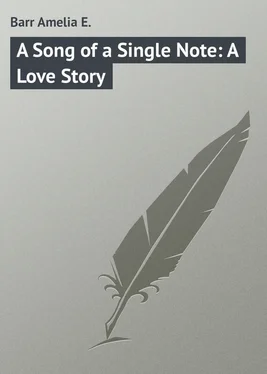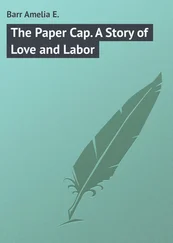Amelia Barr - A Song of a Single Note - A Love Story
Здесь есть возможность читать онлайн «Amelia Barr - A Song of a Single Note - A Love Story» — ознакомительный отрывок электронной книги совершенно бесплатно, а после прочтения отрывка купить полную версию. В некоторых случаях можно слушать аудио, скачать через торрент в формате fb2 и присутствует краткое содержание. Жанр: foreign_prose, на английском языке. Описание произведения, (предисловие) а так же отзывы посетителей доступны на портале библиотеки ЛибКат.
- Название:A Song of a Single Note: A Love Story
- Автор:
- Жанр:
- Год:неизвестен
- ISBN:нет данных
- Рейтинг книги:4 / 5. Голосов: 1
-
Избранное:Добавить в избранное
- Отзывы:
-
Ваша оценка:
- 80
- 1
- 2
- 3
- 4
- 5
A Song of a Single Note: A Love Story: краткое содержание, описание и аннотация
Предлагаем к чтению аннотацию, описание, краткое содержание или предисловие (зависит от того, что написал сам автор книги «A Song of a Single Note: A Love Story»). Если вы не нашли необходимую информацию о книге — напишите в комментариях, мы постараемся отыскать её.
A Song of a Single Note: A Love Story — читать онлайн ознакомительный отрывок
Ниже представлен текст книги, разбитый по страницам. Система сохранения места последней прочитанной страницы, позволяет с удобством читать онлайн бесплатно книгу «A Song of a Single Note: A Love Story», без необходимости каждый раз заново искать на чём Вы остановились. Поставьте закладку, и сможете в любой момент перейти на страницу, на которой закончили чтение.
Интервал:
Закладка:
Neil was silent and unhappy; Maria full of the excitement of the passing moment. They sat in the open window of Neil's office and watched company after company march to the warships in which they were to embark: Grenadiers of Auspach with their towering black caps and sombre military air; brass-fronted Hessians; gaudy Waldeckers; English corps glittering in scarlet pomp; and Highlanders loaded with weapons, but free and graceful in their flowing contour. On these latter especially, both Neil and Maria fixed their interest. Who can say how long national feeling, expatriated, may live? Neil leaped to his feet as the plaided men came in sight. Their bagpipes made him drunk with emotion; they played on his heartstrings and called up centuries of passionate feelings. He clasped his sword unconsciously; his hand trembled with that magnetic attraction for iron that soldiers know. At that moment he said proudly to his soul, "Thou also art of Scottish birth!" and a vision of hills and straths and of a tossing ocean filled his spiritual sight.
Maria's interest was of the present and was centered on the young captain walking at the head of his company; for Quentin Macpherson was a born soldier, and whatever he might lack in a ball-room, he lacked nothing at the head of his men. His red hair flowing from under his plaided bonnet was the martial color; it seemed proper to his stern face and to the musket and bayonet, the broadsword, dirk and pistols which he wore or carried with the ease and grace of long usage. He stepped so proudly to the strains of "Lochaber;" he looked so brave and so naturally full of authority that Maria was, for the moment, quite subjugated. She had told him on the previous night, at what place she was to view the embarkment; and she detected the first movement which showed him to be on the watch for her.
This fleeting pleasure of exhibiting himself at his best to the girl he loves, is a soldier's joy; and the girl is heartless who refuses him the small triumph. Maria was kind, and she shared the triumph with him; she knew that her white-robed figure was entrancing to the young captain, and she stood ready to rain down all of Beauty's influence upon his lifted face. Only a moment was granted them, but in that one moment of meeting eyes, Maria's handkerchief drifted out of her hand and Macpherson caught it on his lifted bayonet, kissed, and put it in his bosom. The incident was accomplished as rapidly and perfectly as events unpremeditated usually are; for they are managed by that Self that sometimes takes our affairs out of all other control and does perfectly, in an instant, what all our desiring and planning would have failed to do in any space of time.
Neil was much annoyed, and made a movement to stop the fluttering lawn.
"What have you done, Maria?" he asked angrily. "The Van der Donck's and half a dozen other women are watching you."
"I could not help it, Uncle Neil. I do not know how it happened. I never intended to let it fall. Honor bright! I did not."
And perhaps Neil understood, for he said no more on the subject as they walked silently home through the disenchanted city. All the bareness of its brutal usage was now poignantly evident, and the very atmosphere was heavy with an unconquerable melancholy. Some half-tipsy members of the De Lancey militia singing about "King George the Third" only added to the sense of some incongruous disaster. Everyone has felt the intolerable ennui which follows a noisy merry-making – the deserted disorder, the spilled wine, the disdained food, the withered flowers, the silenced jest, the giving over of all left to desecration and destruction – all this, and far more was concentrated in that wretched ennui of unhappy souls which filled the streets of New York that hot summer afternoon. For an intense dejection lay heavy on every heart. Like people with the same disease, men avoided and yet sought each other. They dared not say, they hardly dared to think, that their love for the King was dying of a disease that had no pity – that their idol had himself torn away the roots of their loyalty. But they closed their shops early, and retreated to the citadel of their homes. Melancholy, hopelessness, silence, infected the atmosphere and became epidemic, and men and women, sensitive to spiritual maladies, went into their chambers and shut their doors, but could not shut out the unseen contagion. It rained down on them in their sleep, and they dreamed of the calamities they feared.
It was on this afternoon that John Bradley received a new "call" and answered it. Affected deeply by the events of the day, he left his shop in the middle of the hot afternoon and went about some business which took him near the King's College Building, then crowded with American prisoners. As he came under the windows, he heard a thin, quavering voice singing lines very dear and familiar to him:
Ye fearful saints, fresh courage take!
The clouds ye so much dread
Are big with mercy, and shall break
In blessings on your head.
Judge not the Lord by feeble sense,
But trust him for his grace:
Behind a frowning providence
He hides a smiling face.
Then there was a pause and Bradley called aloud: "Brother, who are you?"
"William Watson," was the answer.
"I thought so. How are you?"
"Dying," then a pause, and a stronger voice added, "and in need of all things."
"Brother Watson, what do you want that I can get now?"
"Cold water to drink, and some fresh fruit," and then, as if further instructed the voice added, "when you can, a clean shirt to be buried in."
"Tell William he shall have them." His whole manner had changed. There was something he could do, and he went at once for the fruit and water. Fortunately, he knew the provost of this prison and had done him some favors, so he had no hesitation in asking him to see that the small comforts were given to William Watson.
"He was a member of my class meeting, Provost," said Bradley; "a Methodist leader must love his brother in Christ." Here Bradley's voice failed him and the Provost added, "I knew him too – he used to live in good style in Queen Street. I will see that he gets the fruit and water."
"And if you need anything for yourself in the way of saddlery, Provost, I will be glad to serve you."
"I was thinking of a new riding whip."
"I will bring you the best I have. One good turn deserves another."
Then, after a little further conversation he turned homeward, and men who met him on the way wondered what was the matter with John Bradley. For, without cessation, as he walked, he went over and over the same three words, "Christ forgive me!" And no one could smile at the monotonous iteration; the man was in too dead earnest; his face was too remorseful, his voice too tragic.
The next morning he was very early in Superintendent Ludlow's office. The great man of the Court of Police had not arrived, but Bradley waited until he came.
"You are an early visitor, Mr. Bradley," he said pleasantly.
"I have a favor to ask, Judge."
"Come in here then. What is it? You are no place or plunder hunter."
"Judge, a month ago you asked me to make you a saddle."
"And you would not do it. I remember."
"I could not – at least I thought I could not; now, if you will let me, I will make you the fittest saddle possible – it shall be my own work, every stitch of it."
"How much money do you want for such a saddle, Bradley?"
"I want no money at all. I want a very small favor from you."
"Nothing for the rebels, I hope. I cannot grant any favor in that direction."
"I want nothing for the rebels; I want one hour every Sunday afternoon in the College prison with my class members."
"Oh, I don't know, Bradley – "
Читать дальшеИнтервал:
Закладка:
Похожие книги на «A Song of a Single Note: A Love Story»
Представляем Вашему вниманию похожие книги на «A Song of a Single Note: A Love Story» списком для выбора. Мы отобрали схожую по названию и смыслу литературу в надежде предоставить читателям больше вариантов отыскать новые, интересные, ещё непрочитанные произведения.
Обсуждение, отзывы о книге «A Song of a Single Note: A Love Story» и просто собственные мнения читателей. Оставьте ваши комментарии, напишите, что Вы думаете о произведении, его смысле или главных героях. Укажите что конкретно понравилось, а что нет, и почему Вы так считаете.












